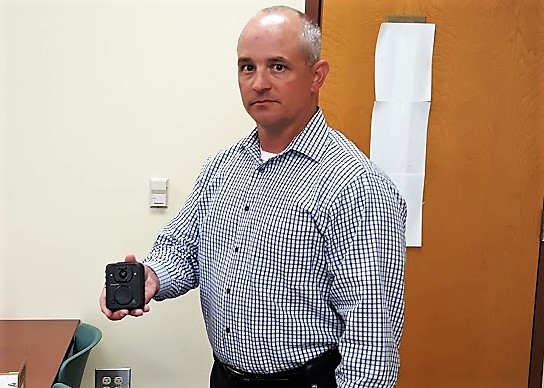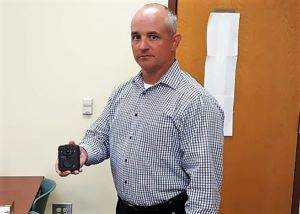
West Columbia Police receive body cameras, ready to put into service
The West Columbia Police Department has received its shipment of 30 body cameras.
 “We’ll take some time to train our department on how to use the cameras,” said West Columbia Police Chief Dennis Tyndall.
“We’ll take some time to train our department on how to use the cameras,” said West Columbia Police Chief Dennis Tyndall.
While there has been a large amount of attention on body cameras for police officers in the last couple of years, the use of the cameras is not new for West Columbia.
“We have used body cameras before,” said Tyndall.
Tyndall has secured millions in grants for the WCPD. And body cameras have been one of the innovations he introduced to local law enforcement way before the cameras became the trend.
But the nature and the quality of the cameras has changed said WCPD Assistant Chief Scott Morrison.
“The cameras we had before did not last as long. And the technology was not there yet,” he said. Morrison called the cameras the department had before “button cams. And he said the technology has been developed to make the cameras of a higher quality.
Tyndall said the cameras available now are a “great tool” and he welcomes the opportunity to implement their use.
PHOTO: West Columbia Asst. Police Chief Scott Morrison and Body Camera.
He said with the cameras his department will be able to pull video and address any discrepancies. He said the video will be valuable in domestic violence cases.
“The victim will tell us one thing during the arrest, but then in court the story will change,” said Tyndall. He said the couple may make up, and the victim may decide to protect the person arrested.
“It’s important to have evidence in court,” said Tyndall, and the video will provide a record.
Tyndall also said that perception is sometimes altered during an incident and the video will help provide a record when memory fails.
“If anything is forgotten, you can look at the camera,” he said. “Or when the adrenaline is flowing, it’s hard to remember everything.”
“They are out on patrol daily. They deal with suspects, traffic stops and offenses of that nature,” said Tyndall.
In August of 2016, the S.C. Department of Public Safety was given funds via the General Assembly of $5.8 million to buy cameras for the state’s law enforcement agencies. The West Columbia Police Department received $34,395.
Morrison said in addition to the purchase of the 30 cameras, new computer software and hardware had to be secured to be able to run the cameras. The cameras are for the 28-officer staff this on the streets. More funding- for cameras for additional staff- has been requested, Morrison said.
 He said that there is policy and law that goes along with the use of the cameras. That will be taught to officers during the training sessions.
He said that there is policy and law that goes along with the use of the cameras. That will be taught to officers during the training sessions.
The training will teach officers when to turn on their cameras and other procedures.
“We will get them familiar with the technology,” said Morrison.
And like Tyndall said, Morrison said the cameras will be a valuable tool.
Both Tyndall and Morrison said they want the department to be as transparent as possible.
“It will help accountability,” said Morrison. He said if there is a question in court the video is evidence. “You can see right there in color who said what,” he said. “It will take a lot of the guess work out of it.”
Morrison also said that officers do their job as trained 99 percent of the time.
“The cameras will help us more than they hurt us,” he said. “But every now and then something happens.”
With Tyndall at the help of the West Columbia Police Department it has been recognized as one of the top 50 innovators in government in the country by Harvard University.
Besides implementing body cameras before police other forces, The WCPD was one of the first to use automated license plate reading technology.
Part of the South Carolina General Assembly body camera legislation
“Body-worn camera” means an electronic device worn on a person’s body that records both audio and video data. All state and local law enforcement officers must be equipped with body-worn cameras.
A law enforcement officer shall activate the body-worn camera to record all contacts with people, from beginning to end, in the performance of official duties.
The law enforcement officer shall inform the person that the officer is using a body-worn camera to record the contact between officer and the person.








